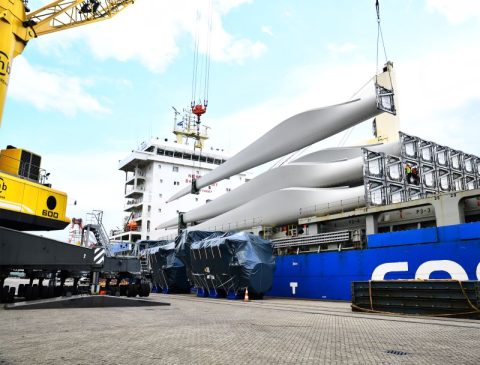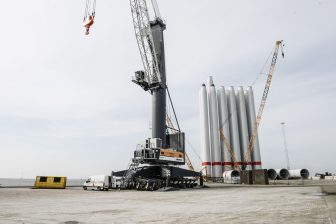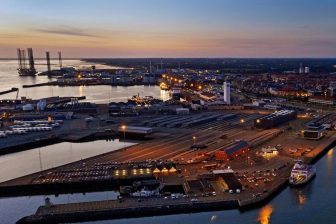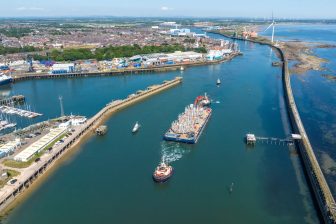
Port of Rotterdam’s breakbulk throughput slumps
General cargo throughput at the Port of Rotterdam in 2023 has dipped 15.1 per cent compared to the previous year, with total breakbulk slipping, as the focus shifts towards making the port more sustainable. However, as the Port Authority stressed, the financial results were stable, opening the door for investments in a future-resilient port.
Looking at the breakbulk figures, general cargo stood at 6.49 million tons in 2023, versus 7.64 million tons a year prior. Roll on/Roll off (RoRo) cargo throughput stood at 25.88 million tons, 5 per cent below the 27.25 million tons below 2022 throughput volumes. Overall, the total breakbulk stood at 32.37 million tons for the period under review, 7.2 per cent below the 34.89 million tons reported in 2022.
Total cargo throughput in the port of Rotterdam this year amounted to 438.8 million tonnes, 6.1 per cent less than in 2022 (467.4 million tonnes). The fall was mainly seen in coal throughput, containers and other dry bulk. Throughput rose in the agribulk, iron ore & scrap, and LNG segments.
Boudewijn Siemons, CEO of the Port of Rotterdam Authority, said, “2023 saw ongoing geopolitical unrest, low economic growth due to higher interest rates and faltering global trade, all of which had a logical effect on throughput in the port of Rotterdam.”
“However, the year also saw many major investment decisions and milestones in the transition to a sustainable port. We made the final investment decision for the construction of the CO2 transport and storage project, Porthos. Construction work also began on the national hydrogen network in the port of Rotterdam. And we celebrated a number of significant developments in the logistics segment this year, such as the announcement of the expansions of the APMT and RWG container terminals, and the opening of the CER. All these developments will take us a step closer to a successful and future-resilient port and industrial complex,” he added.
Port’s revenue up despite faltering throughput
The Port Authority reported a revenue increase of 1.9 per cent to € 841.5 million ($913.25 million), consisting mainly of contract revenue from land leases, and port dues. As a result of price changes and new contracts, contract revenue rose by € 28.4 million.
Operating expenses increased by 3.8 per cent (€ 10.7 million) to € 292.9 million because of higher payroll expenses and overhead. The operating result before interest, depreciation and taxes (EBITDA) rose on balance by 0.9 per cent to € 548.6 million.
Read also: Port of Rotterdam breakbulk throughput down with lower investments
The net result was 5.6 per cent (€ 13.7 million) down at € 233.5 million, versus € 247.2 million in 2022, the Port Authority said. The lower net result was attributable to two one-off items in 2023.
The Port Authority invested a total of € 295.4 million, almost 15 per cent more than in 2022 (€ 257.0 million). The largest investments in 2023 were the investments in quay walls for the container sector (€ 72.9 million), land reclamation for the Prinses Alexiahaven (€ 23.1 million) and the fendering in the Rozenburg lock (€ 12.8 million).
Uncertain future for breakbulk in an unpredictable 2024
Against the backdrop of geopolitical developments and upcoming elections in several countries, 2024 is also expected to be an unpredictable year, according to the Port Authority. In a recent white paper, Port Authority’s leading figures also noted that, while breakbulk will play an important role in the energy transition necessary to achieve carbon neutrality by 2050, but, by definition the future is uncertain.
It is all the more important in these turbulent times for the port to maintain a steady course and implement plans that will further the transition. Construction work will begin on Porthos in 2024 and the development of the second conversion facility will continue.
Investment decisions are expected for hydrogen plants, bio-refineries, the Maasvlakte-Zuid rail yard and the Princess Alexia Viaduct on the Maasvlakte.
Furthermore, new steps are being taken to establish shore power facilities for cruise vessels, container vessels and RoRo vessels, among others. Work will also continue in 2024 on the deployment and availability of new, renewable fuels, and investments will be made in charging infrastructure for electric trucks to meet the expected demand for sustainable road transportation.
You just read one of our premium articles free of charge
Register now to keep reading premium articles.




